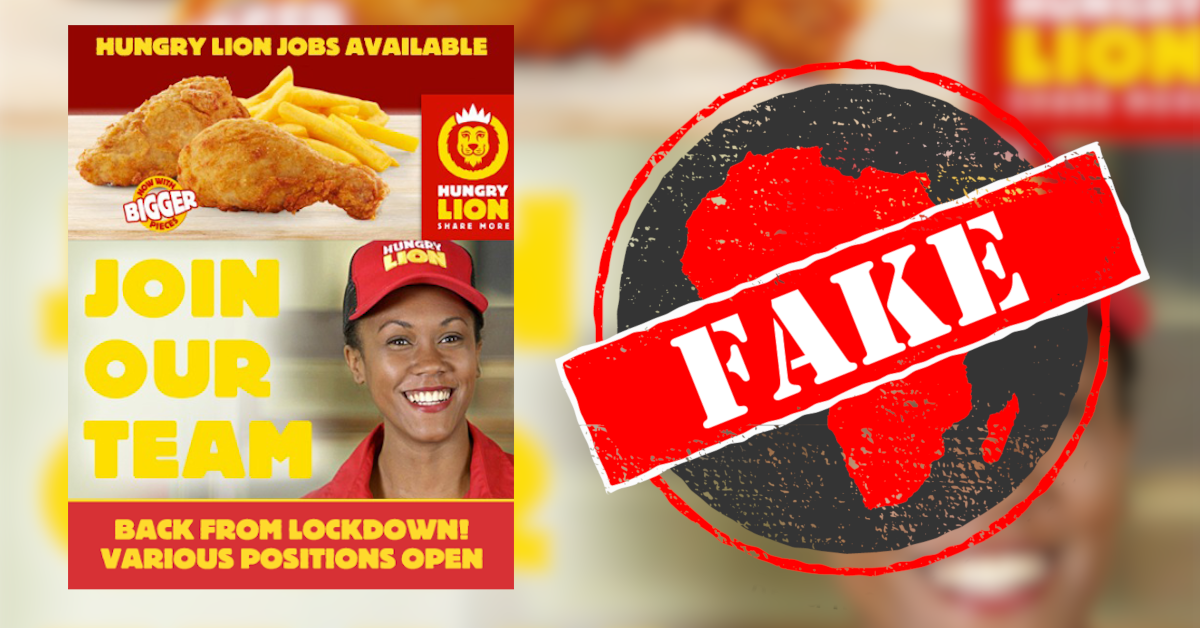A number of Facebook pages continue to advertise fake jobs at South African companies.
One recent advert, posted on 10 June 2020, claims to be from South African fast food chain Hungry Lion. It says the chain is “back from lockdown” and offering jobs for cashiers, cleaners and cooks.
The post includes a graphic that looks like a legitimate ad: it shows products sold at Hungry Lion, a woman in branded uniform and the company logo.
Many South African restaurants have reopened their doors for delivery of food, following the lifting of some restrictions put in place to curb the spread of Covid-19. But the ad for jobs at Hungry Lion is fake.

Facebook users are asked to comment “YES” if they are available or click on a link to apply for the job. The link goes to a web page that reads “Hungry Lion Recruitment Agency – CLICK HERE TO APPLY”.
But that link is to yet another web page advertising jobs at KFC, a different fast food chain. Several colourful buttons can be seen on this page: one asks you to click to “download an application form”, another asks you to click to “apply now”.
Antivirus software on our computers identified these buttons as dangerous. “The link can be used by criminals to damage your computer or personal data,” a pop-up warning read.
This setup is similar to a number of other Facebook pages Africa Check has investigated for posting fake job ads.
When applying for a job, it’s best to go through official channels. Hungry Lion’s official website says CVs should be sent to [email protected] or dropped off with a manager in store. – Africa Check
One recent advert, posted on 10 June 2020, claims to be from South African fast food chain Hungry Lion. It says the chain is “back from lockdown” and offering jobs for cashiers, cleaners and cooks.
The post includes a graphic that looks like a legitimate ad: it shows products sold at Hungry Lion, a woman in branded uniform and the company logo.
Many South African restaurants have reopened their doors for delivery of food, following the lifting of some restrictions put in place to curb the spread of Covid-19. But the ad for jobs at Hungry Lion is fake.

Use official channels to apply for jobs
Facebook users are asked to comment “YES” if they are available or click on a link to apply for the job. The link goes to a web page that reads “Hungry Lion Recruitment Agency – CLICK HERE TO APPLY”.
But that link is to yet another web page advertising jobs at KFC, a different fast food chain. Several colourful buttons can be seen on this page: one asks you to click to “download an application form”, another asks you to click to “apply now”.
Antivirus software on our computers identified these buttons as dangerous. “The link can be used by criminals to damage your computer or personal data,” a pop-up warning read.
This setup is similar to a number of other Facebook pages Africa Check has investigated for posting fake job ads.
When applying for a job, it’s best to go through official channels. Hungry Lion’s official website says CVs should be sent to [email protected] or dropped off with a manager in store. – Africa Check
Republish our content for free
For publishers: what to do if your post is rated false
A fact-checker has rated your Facebook or Instagram post as “false”, “altered”, “partly false” or “missing context”. This could have serious consequences. What do you do?
Click on our guide for the steps you should follow.
Publishers guideAfrica Check teams up with Facebook
Africa Check is a partner in Meta's third-party fact-checking programme to help stop the spread of false information on social media.
The content we rate as “false” will be downgraded on Facebook and Instagram. This means fewer people will see it.
You can also help identify false information on Facebook. This guide explains how.



Add new comment